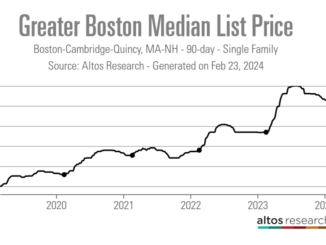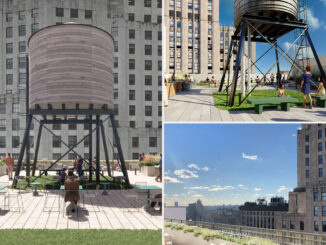
The town of Newton, Massachusetts is working to comply with a new state law that requires the construction of new multifamily housing units in areas served by public transit, according to reporting from the Boston Globe.
The law, which went into effect in early February, requires 177 communities served by the Massachusetts Bay Transportation Authority (MBTA) to eliminate barriers that could restrict the zoning and construction of multifamily housing units.
As of February, just seven of the 175 initial communities that were required to submit preliminary compliance plans had failed to do so by the initial deadline.
“This new law requires that an MBTA community shall have at least one zoning district of reasonable size in which multi-family housing is permitted as of right and meets other criteria set forth in the statute,” according to information posted by the state government.
Other criteria include a minimum density of at least 15 units per acre; that a development be located no more than one-half mile from a transportation hub (such as a commuter rail station, ferry terminal, subway station or ferry terminal); and that the units have no age restrictions and are suitable for families with children.
However, the debate in Newton could be more contentious than in other parts of the state, according to the Globe.
“Newton, one of the region’s wealthiest enclaves, has to zone for more new units under the state rezoning law, MBTA Communities, than almost any other community,” the article states. “Should the rezoning overcome fledgling resident opposition and pass by the end-of-year deadline, it could serve as a model for other communities and represent a major turning point in the city’s attitude toward multifamily housing.”
The median home price for a single-family home in the area is $1.6 million, according to data from Warren Group.
The debate is due in large part to the way Newton is currently zoned, which is primarily for single-family homes. Some apartments have been constructed in recent years, but the construction level has been low.
Between 2010 and 2020, roughly 1,100 new housing units were added in Newton, accounting for just over 3% of the area’s total housing stock. This has led Newton to have some of the highest housing prices in the state.
In addition to the price concerns, most multifamily construction has been concentrated in commercial areas in recent years.
The current proposal would add an estimated 10,000 new units, depending on parking requirements, which is well above the 8,330 units mandated by the new law. The new unit construction would also impact only 3% of Newton’s land and is not expected to impact existing single-family neighborhoods.
This is the latest step being taken at the state level to temper the housing supply shortages occurring nationwide. In New York, Gov. Kathy Hochul is pushing the state’s government to override local zoning laws and mandate more housing construction in the state’s suburban counties.
In Washington state, Gov. Jay Inslee recently signed a series of bills designed to spur more affordable housing construction, including through the elimination of single-family zoning. Similar measures have been introduced in states like Florida and Minnesota, but have ultimately been reversed.



